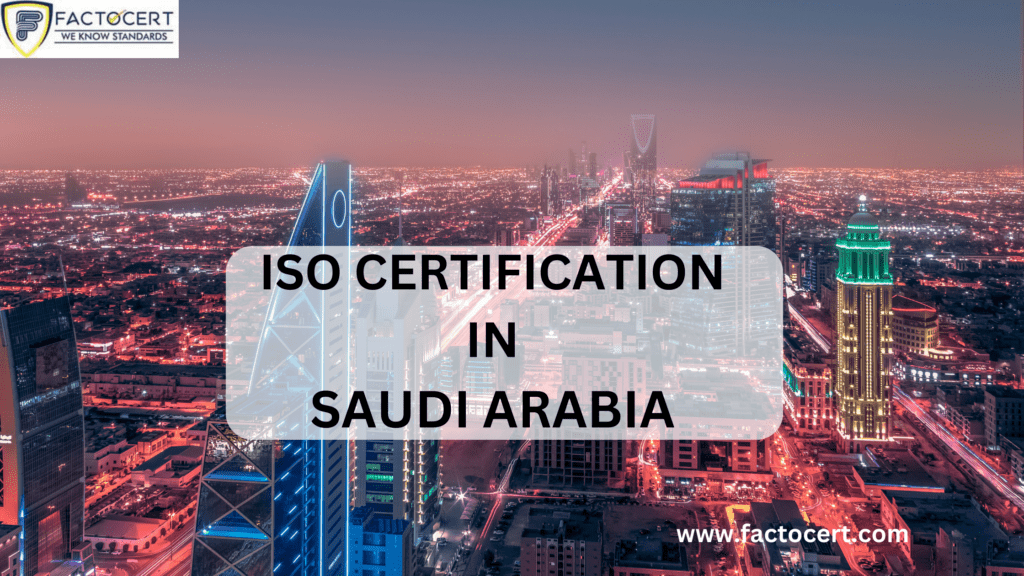Obtaining ISO certification in Saudi Arabia is critical because it ensures compliance with internationally accepted standards for excellence, productivity, and customer satisfaction. It demonstrates a company’s commitment to upholding international standards, standardizing practices, and consistently enhancing operations. Obtaining ISO certification is essential for increasing market access, customer confidence, and competitiveness in Saudi Arabia. By demonstrating an organization’s commitment to maintaining the highest levels of quality, improving processes, and adhering to best practices, certification helps Saudi Arabia’s standing in international markets by demonstrating dependability and quality-driven organizational activities.
Why is ISO certification in Saudi Arabia required?
Because ISO certification in Saudi Arabia offers so many advantages in terms of competition, market access, and excellent quality, it is widely valued in Saudi Arabia across a number of industries.
Improved Management of Quality:
Businesses in Saudi Arabia that want to continue providing consistently high-quality goods or services need to obtain ISO certification, particularly ISO 9001, for top-notch management systems. It provides a systematic framework that ensures adherence to guidelines, rules, and oversights. This systematic approach maximizes resource use, reduces errors, and improves product reliability and quality.
International Acknowledgment and Market Access for:
Saudi Arabia has a strong export-oriented economy. An effective tool for Saudi Arabian businesses looking to go global is ISO certification. Numerous global marketplaces give preference to suppliers or partners who hold ISO certifications, facilitating easier access and increased competitiveness. The elimination of employment barriers, the creation of trust funds, and the internationalization of the Saudi Arabian market for goods and services are all aided by this recognition.
Benefits of Competition:
Services provided by Saudi Arabia gain a competitive advantage through ISO accreditation. It sets certified businesses apart from their competitors by demonstrating a commitment to quality and complete client satisfaction. By portraying Saudi Arabian businesses as reliable and superior establishments, this differential can increase market share, enhance client retention, and strengthen the brand’s online reputation.
Client Contentment and Self-Assurance:
Customer confidence matters in the contemporary, accessible market. An organization’s ISO accreditation, which offers set quality standards, is proof of its commitment to meeting the needs of its customers. Long-lasting relationships are forged, client satisfaction rises, trust is fostered, loyalty is enhanced, and favourable referrals are generated for Saudi Arabian organizations by this accreditation.
Optimal Performance and Financial Savings:
Saudi Arabian businesses are forced to become more efficient in order to comply with ISO requirements. By focusing on resource application, waste reduction, and procedure improvement, organizations can realize significant cost reductions. Standardized processes reduce errors, waste, and rework while also increasing overall functional efficiency and profitability.
A culture of ongoing development
The ISO certification emphasizes a culture of continuous improvement. This entails creating an environment in Saudi Arabia where businesses continuously look for ways to improve their operations, products, and services. Continuous development fosters creativity, flexibility, and proficiency, which helps Saudi Arabian services stay competitively priced in ever-changing conditions, stay relevant, and adapt to shifting market demands.
Supplier Relationships and Supply Chain Management:
Long-term distributor connections and supply chain monitoring dependability are preserved by ISO certification. Businesses with Saudi Arabian certification have the authority to demand suppliers to meet these strict standards, guaranteeing consistency across the supply chain. Harmonization reduces risks, increases integrity, and builds a network of trustworthy partners, all of which benefit the entire company community.
Respect for Regulations:
The ISO certification upholds a number of regulatory requirements, providing a formal foundation for compliance. Following these worldwide guidelines enables Saudi Arabian businesses to comply with national and international quality standards, manage complex regulatory frameworks, and reduce legal and regulatory risks.
Productivity and Employee Engagement:
Adopting ISO standards promotes employee empowerment and involvement. Employees who are engaged own high-quality goals provide original ideas and have a clearer understanding of their roles. Employees in Saudi Arabia thus grow more driven, content, and efficient since they see themselves as essential to the company’s success.
Building for Resilience and Sustainability:
An organization’s resilience and long-term growth are preserved by ISO certification. Businesses in Saudi Arabia can create a strong foundation for sustained success by prioritizing performance, superior quality, and complete customer satisfaction. Resistant organizations are more likely to endure unanticipated issues, changes in the market, and fluctuations in finances, ensuring their long-term survival.
In conclusion, ISO certification benefits Saudi Arabia’s services in several marketplaces. Raising the bar for quality facilitates market access, competitiveness, customer reliance, operational efficiency, and continuous progress. They are putting ISO standards into practice, preparing Saudi Arabia’s businesses for resilience, steady growth, and success in both local and foreign markets.
Why do Saudis choose Factocert above other options for ISO certification?
As far as ISO consultant in Saudi Arabia are concerned, our team consistently delivers outstanding results. According to the automatic creation of name instances by each device head, they are not required for the business to function. Methods deemed effective are those that do not alter the association’s core principles.
With an emphasis on first ISO recommendations, we offer certified ISO consultants in Riyadh, Jeddah, Dammam, Al Khobar, Dhahran, Buraidah, Al-Ahsa, Qatif, Jubail, and opulent important regions. Among the new ISO Criteria are the ISO 22000, 17025, 45001, audit registration, stringent training, and ISO standards. These products meet ISO 14001 and ISO 27001 requirements, among others.
Using ISO assets could potentially improve the Saudi financial engine. We will provide you with an estimated certification rate for the time being.
Visit this site: ISO Certification in Saudi Arabia.





